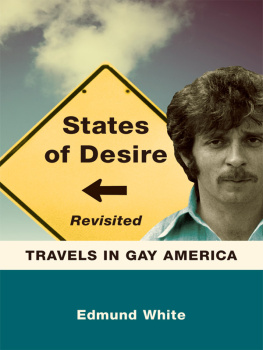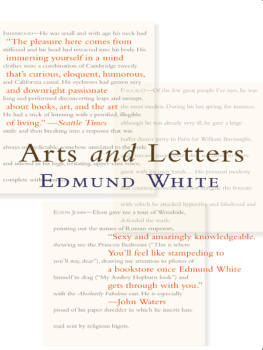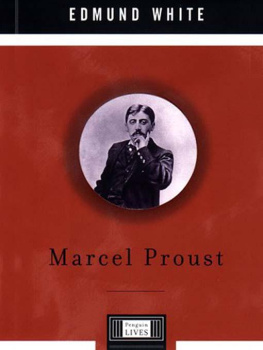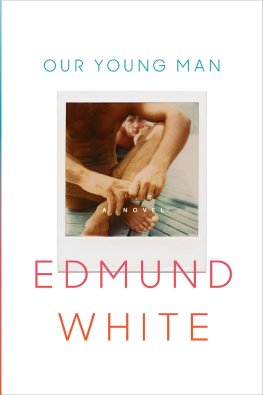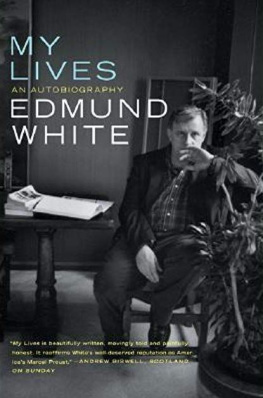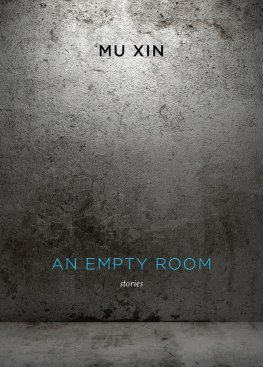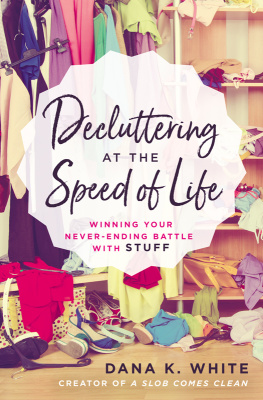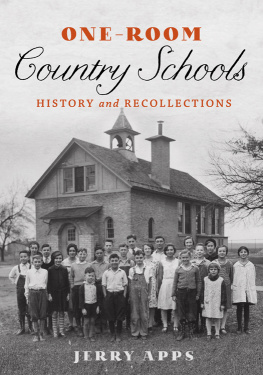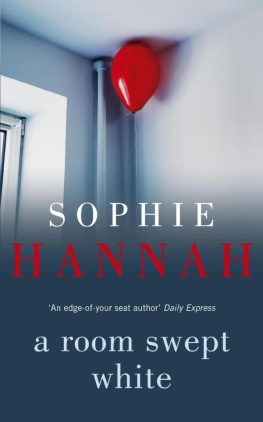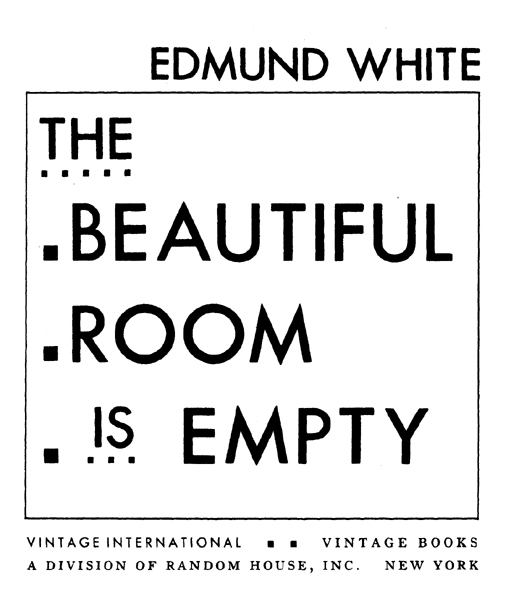ACCLAIM FOR EDMUND WHITES
THE BEAUTIFUL ROOM IS EMPTY
Powerful. As [the protagonist] grows to recognize and act on his sexual impulses, we are led through a gallery of colorful characters.
The New York Times
Every line of this exquisitely written, cheeringly humane novel conveys its gladdening sentiments, compulsive narrative and precise wit with elegance and virtuosity.
Literary Review (London)
Whites gift for dialogue and anecdote and the melancholy elegance of his prose persuade the reader to delve deeper inside the soul of a man whose spiritual and sexual odysseys chart the development and joyfully confirm the existence of the elusive notion of gay sensibility.
Publishers Weekly
Highly recommended. What emerges is the picture of a young man desperately struggling to come to terms with himself, a struggle that is universal even if the context for every individual is different.
Library Journal
Contents
To Stanley Redfern
Ah! Do you have to be sensual to be human?
Certainly, Madame. Pity is in the guts, just as tenderness is on the skin.
Anatole France, The Red Lily
Sometimes I have the feeling that were in one room with two opposite doors and each of us holds the handle of one door, one of us flicks an eyelash and the other is already behind his door, and now the first one has but to utter a word and immediately the second one has closed his door behind him and can no longer be seen. Hes sure to open the door again for its a room which perhaps one cannot leave. If only the first one were not precisely like the second, if he were calm, if he would only pretend not to look at the other, if he would slowly set the room in order as though it were a room like any other; but instead he does exactly the same as the other at his door, sometimes even both are behind the doors and the beautiful room is empty.
Franz Kafka,
in a letter to Milena Jesensk
ONE

I met Maria during my next-to-last year in prep school. She was studying painting at the art academy just across the street from my school, Eton, and she was seven years older than I, but she scarcely seemed to notice the difference. I see her even now striding along in black pants and a mans white shirt spotted with paint, her hair slicked back behind her ears, squinting into the faint winter sunlight. Shes wearing white sneakers, also spattered with paint, a sailors pea coat and no makeup, although her eyebrows have been slightly plucked. She looks very scrubbed and German but also faintly glamorous; the glamour clings to her like the smell of Gitanes in wool. Is it the hard defiance in her eyes or just the slicked-back hair with its suggestion of the high-school bad girl that lends her this dangerous aura?
Its terribly cold, snow is excitingly in the air like the promise of Christmas, were hurrying up the steps leading to the academys museum, and she has a cigarette dangling from her small blue hand purely for ornamental effect, since she doesnt know how to inhale.
It must be Sunday because there are two middle-aged ladies out for the day from the big ugly city nearby, bundled up in old furs and posing on the steps for a man who is swaddled in a car coat. Hes signaling the ladies to squeeze together, now hes inviting them to smile, now hes adjusting the focus and about to snapwhen Maria sails between him and his subjects muttering to me, Dont worry about this guy. Believe me, hes not exactly an artist.
I remember that moment because it was so out of character for Maria. In the 1950s in the Midwest there were very few culture vultures, the Abstract Expressionists were still beleaguered, and those ladies and the photographer were about to go into the school museum to look at the student show and, no doubt, have a good laugh. Is that a Ferris wheel? A nose? Or did someone just toss his cookies? theyd ask. The real cards would wonder if the painting had been hung upside down by mistake.
Things were simpler, clearer then. On one side were the painters, a few taunted, poor, scrawny kids, and on the other the philistines, the fat-cat majority. Certainly the painters felt justified at striking back at what they called the boor-zhwah-zee, but Maria hated all sorts of cruelty, especially to other women and to animals. A little bit later, just a year or two later, and shed never have insulted that Sunday photographer. Shed have said, Who knows, maybe hes a genius in disguise. After all, Rousseau was just a Sunday painter. She thought some sort of second American Revolution would have to break out to equalize the wealth, but she prayed it would be bloodless.
A bearded sculptor in his early twenties named Ivan, who dutifully molded and cast big bronze insects, though he far preferred living the life of the artist to making art, had discovered me in the Eton barbershop. The art academy was side by side with the boys school, but the students and teachers of the two institutions never mixed, although a few of the poorer artists worked in the Eton kitchen. The barbershop, the kitchen, the Saturday-night movies when everyone sat on folding chairs on the basketball court of the boys gymnasiumthose were the only places where the two populations might have spoken to each other, though they never did.
I did. I spoke to Ivan. I dont know what I said, but he invited me to his studio. He thought I was precocious for some reason; maybe he just picked up on my eagerness to gnaw off the restraints. Through him I met other painters and sculptors, including Maria.
In the long winter afternoons when the skies would turn as cold and silvery as fish scales, Id sit in the painters studios and smell the espresso cooking down in nickel-coated pots on hot plates and try to find in their work what theyd secreted there. At first Id struggle to see things, guess at what was being masked by all that fudge-thick impasto, that haze of flung drops, but I discovered very quickly how bourgeois my interpretationsor any interpretationsseemed to the artists. I also learned to say painter not artist.
I was so eager to please (an extension of the high-school urge to Be Popular) that after only a few hasty observations of how the painters responded to each others work, Id mastered their technique. I, too, would sit on a high wood stool, itself piebald with spattered paint, and look and look without saying a word. That was the trick : say nothing, show nothing. A senile radio would be muttering to itself. The smell of oil paint and turpentine (for acrylics had not yet been introduced) stung my eyes and made my nose run. Windows climbed one wall, floor to ceiling, and through them I could see the silver-lined gray clouds boiling and descending like a deity about to abduct an extremely willing shepherd.
I looked and looked at the painting, trying to figure out what was there to be seen. Was it a sort of chess problem to be solved, a visual riddle, or was it a cats cradle of tensions (Id heard someone talking about push and pull)? Or was I being too intellectual (a fault, as Id gathered)? Should I regard the painting as a spiritual X-ray, a glimpse into the painters unconscious ecstasy or agony? Or was it something like a football field on which conflicting teams of thoughts and feelings had skirmished and left this muddy aftermath of the action (for people spoke of action painting)?
The painters themselves werent quite sure, I realize now. After all, they were students in a provincial school and had nothing to go on beyond occasional visits to New York and perusals of stylishly inscrutable art magazines in which the celebrated genius of the moment intimidated everyone with grim whimsies (If a bull wants to sit down in my arena, let him! a gaunt young art widow, herself a painter, had recklessly declared).
Next page

